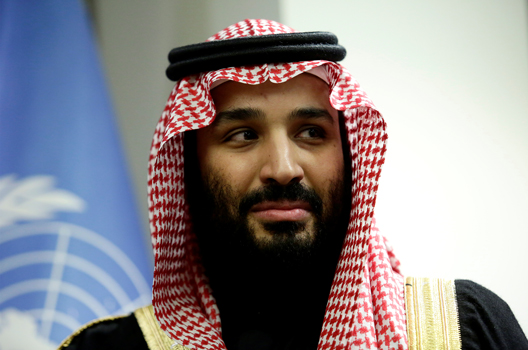 Saudi Crown Prince Mohammed bin Salman’s visit to the United States, following on the heels of his trips to the United Kingdom and Egypt, marks his debut on the international stage as the king-in-waiting of a country he could rule for decades.
Saudi Crown Prince Mohammed bin Salman’s visit to the United States, following on the heels of his trips to the United Kingdom and Egypt, marks his debut on the international stage as the king-in-waiting of a country he could rule for decades.
In the United Kingdom and now in the United States, the crown prince, popularly known as MbS, has capitalized on an opportunity to try and reassure international investors that Saudi Arabia is a safe place for business in the wake of anti-corruption crackdown in November 2017 that created unease among international investors.
MbS’s visit to the United Kingdom took place alongside Brexit negotiations and London’s attempts to pave the way for the UK’s economic future once separated from the European Union (EU). As a result, British Prime Minister Theresa May has sought to promote a “Global Britain,” open to new trading partnerships.
The Crown Prince’s visit to London, therefore, took on added importance to a British government anxious to offset the uncertainties related to Brexit and desperate to secure a vote of investor confidence from Saudi Arabia.
British trade and investment with the Gulf Cooperation Council (GCC) states was expected to be a key plank of this initiative, but the rift between Qatar and three other GCC member states—Saudi Arabia, Bahrain, and the United Arab Emirates (UAE)—has put paid to those hopes. The GCC has, for all intents and purposes, ceased to function since the Gulf crisis began last June.
Although MbS presented a message that Saudi Arabia remains open and safe for investment, his trip to London produced underwhelming results and fell far short of British government hopes of $100 billion in defense deals and investment ventures. Negotiations for the biggest-ticket item—a Saudi purchase of forty-eight Typhoon fighter jets worth about $7 billion—ended with merely a letter of intent rather than a full order for the aircraft.
The US-Saudi relationship, on the other hand, will continue to endure despite principals in both capitals who have proved themselves more volatile and unpredictable than their predecessors. Significant investment opportunities—from the healthcare and energy sectors to aviation deals and Silicon Valley tie-ups—remain on the table during MbS’s visit.
However, the US economy is in far less need of a statement of intent from an important trading partner than its counterpart in London. What Washington wanted was sales. While both the United States and the UK remain mired in political turmoil, Washington has turned inward and become more protectionist under the administration of US President Donald J. Trump, rather than trying to attract greater foreign investment as May has done. This approach offered opportunities for MbS to show that Saudi investment will contribute to Trump’s America First agenda, namely by supporting US manufacturing jobs.
Ultimately, MbS walked away from his meeting in Washington with an agreement for $25 billion worth of arms sales to Saudi.
In addition, London and New York remain in competition to host the planned initial public offering (IPO) of 5 percent of Saudi Aramco, but that listing has been delayed and may not happen at all if the Saudis opt for a private placement together with a local listing. The continuing delay in the listing has frustrated MbS’s hopes of wooing Wall Street and dampened interest in his New York visit among Fortune 500 companies. Frustration was heightened by the fact that Saudi officials did not use the occasion of MbS’s visit to announce any breakthrough in the proceedings, but continued to send cautionary “wait-and-see” signals about the IPO.
For MbS and his entourage, the visits to the United Kingdom and the United States offered an added opportunity to gauge the level of international interest in participating in Vision 2030 as the ambitious planned overhaul of the Saudi economy begins to kick into gear. Vision 2030 was last showcased at the Future Investment Initiative held in Riyadh at the end of October 2017. However, at the time, the event was quickly overshadowed by the anti-corruption crackdown that targeted princes, businessmen, and officials. Investor goodwill generated by the Future Investment Initiative gave way to uncertainty as a large swathe of Saudi Arabia’s business elite, including key figures familiar to international partners, were caught up in the anti-corruption probe and its opaque aftermath.
In an attempt to sway public opinion back in his favor, MbS has raised expectations domestically that he is the man to transform Saudi Arabia. As such, he will be judged by his ability to deliver on his promises of social reform and economic diversification. Another crucial consideration is whether or not he can succeed in weaning the Saudi economy off of oil and generating jobs for the hundreds of thousands of young Saudis entering the labor market with advanced skills and qualifications but struggling to find suitable, well-paid jobs.
MbS’s visit to the United States is an important litmus test of whether an economy that is not as desperate for trade and investment as in Britain is as willing to bet on his big economic vision, and not as narrowly focused on just selling arms to Saudis.
Kristian Coates Ulrichsen is the fellow for the Middle East at Rice University’s Baker Institute for Public Policy. You can follow him on Twitter @Dr_Ulrichsen
Image: Saudi Arabia's Crown Prince Mohammed bin Salman Al Saud is seen during a meeting with U.N Secretary-General Antonio Guterres at the United Nations headquarters in the Manhattan borough of New York City, New York, U.S. March 27, 2018. (REUTERS/Amir Levy)
